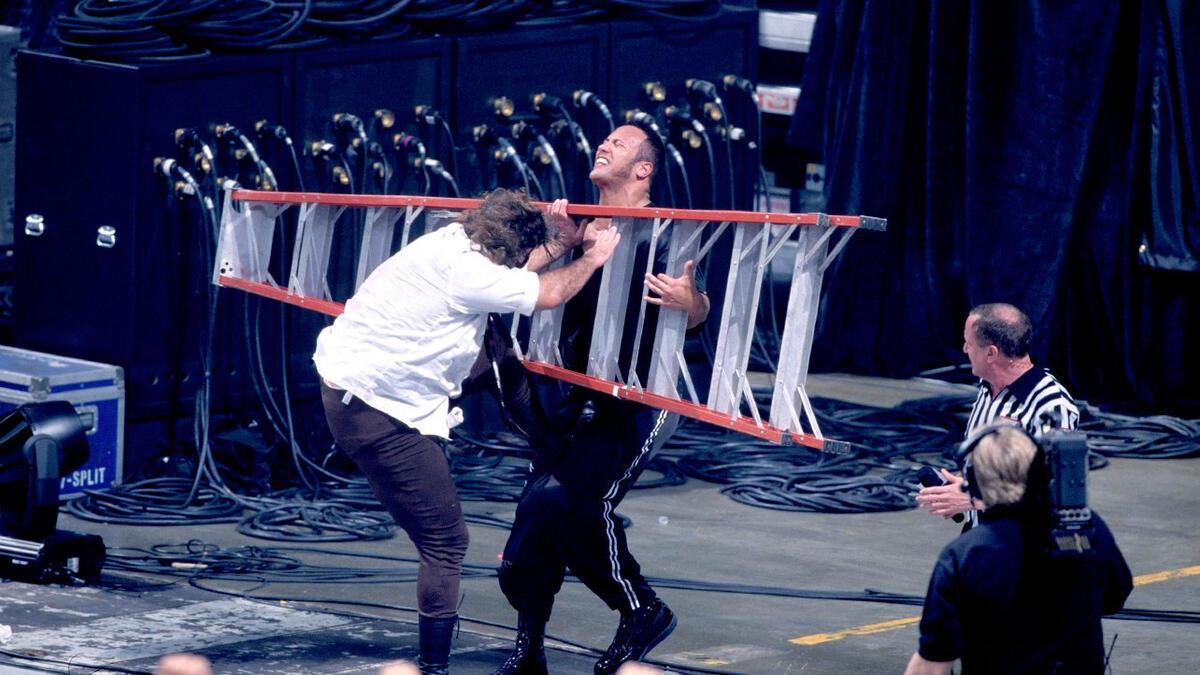Pipebomb show
welcome to pipebombshow's website here you can see updates about wwe match shorts highlights
Articles
The Rock vs Mankind WWF royal rumble 1999

Not least because of the immense brutality, the "I Quit" match, The Rock versus Mankind, 1999 Royal Rumble, "the battle of the minds", storytelling and the writing of the script represented a watershed moment in the history of this entertainment business. On January 24, 1999, these were far from walk in the park; the saga between two of the most recognized faces in the world had been playing out for months culminating in the one of the most hyped matches in the business clashing on the main event of one of the biggest events of the year, the Royal Rumble.
Background and Build-Up
To allow the reader to understand the complete picture of the ways in which the Royal Rumble can be impacted, the author must be aware of the genesis of the feud that culminated in the Royal Rumble. For instance, man took the wrestling globe by year by the foot by attaching to the WWE Championship wish from The Rock only yesterday. This victory (besides being a surprise) was the final achievement of the protracted efforts of humankind and the desire to earn a noble title of a champion. However The Rock, the one who called himself the "People’s Champion’s Champion”, did not simply get over the losing. Having Vince McMahon's blessing and a rabid following, The Rock was determined to get back what he felt was rightfully his.
The competition went far beyond championship ambitions alone; it was a struggle between personalities, between ideas, between shades of fandom. Mankind, a character deeply loved by fans for his resilience and unpredictability, stood in stark contrast to The Rock, whose charisma and slick mic skills endeared him to a different segment of the audience. The competition was prepared for a fight that will forever be immortalized in the history of wrestling.
The Match Begins
After the arrowhead pond bell tolled, the scene buzzed. The two men then bumped into each other in a tangible way, simultaneously hitting each other very hard, producing some painful and detectable impacts in the courtyard. This outlandish fighting scheme was also evident in the battle against The Rock not with ordinary punches, but with the body with which the fighter has been familiarized as such it weapon. Immediately it became evident that the inherent violence of the supposed sport transcended the relatively "gentle" phases of its evolution to other objects, as steel chairs were brought into play, alongside other objects that reflected the banned nature of the supposed sport.
By the end of The match, The Rock's cunning was oh so obvious that he started to use the mind games (as he was famous for it). He constantly took advantage of every chance to mock Mankind, shouting insults through the megaphone the cheering crowds chanted for, "Mankind! Mankind!1 For every moment of emotional experience the level of danger (the stakes) rose, leading to further escalation of the drama and the suspense. The Rock's ability to maintain his trademark stoicism in the face of adversity (i.e., grounded the impact) explaining why he is one of the world's most charismatic entertainers.
The Chair Shots and Turning Points
At that exact juncture the game changed only when The Rock, having tied Mankind in a clutch, left Mankind exposed to beating. Since, the atrocity of the chair bullets remaining to be shot down, this period of time has been put to heavily debate and discussion for decades. Administer by humankind’s lack of ability to fight back, The Rock went to town on Mankind's head with a series of unprotected chair strikes received unchecked that raises all of the relevant questions from a professional stand, safe working practices, and the exaction of professional wrestling's “wrestlers.
On the deepest level, viewers witnessed a stream of human blood leaving the skull of Mankind, a photorealistic manifestation of the hazards wrestlers suffer in the pursuit of the chance to walk a ring. It was horrific, but very addictive and thus it heightened the narrative of the story to another level. Such experiences challenged the audience to cross the line between entertainment and "real" life human body and, at the same time, put ethical issues about how much the promoters are willing to go to induce excitement and resonate with the fans.
Climactic Moments
Then let the match conclude, the pressure as thick as a teardrop of glue in the atmosphere. The battle between The Rock and Mankind played out on the street in a brawl at the ramp access zone, which offered them a backdrop to exhibit the texture of their relationship as well as its concrete consequences. Holding the microphone in hand, The Rock kept saying, did he still call for a towel, making Mankind stammer vaguely. Mankind’s silence and defiance became a statement of his character, embodying the spirit of a fighter unwilling to submit.
As a truly surprising twist, WWE production staff even provided a pre-shot example courtesy of Mankind, who said, "I quit and it unfortunately sealed his doom in the contest. This choice generated controversy among the fans, the media commentators, because it was discussed that the ultimate score of the game has been (real) or has not been. Humans fought the gagging spirit of the match only in the recording of the match; the audio file had made wrestling plot trivial, sparking one to question the correctness of created storylines or the lengths to which promoters would go to keep the story going.
The Fallout and Legacy
The immediate fallout from the match was multifaceted. Mankind, though defeated, remained a beloved figure in wrestling. They saw him as a victor who had been through more than any single game, or series of games, should demand of an artist. Being able to withstand the hardships he endured was what sustained his connection with the mosh pits and that he wasn't just some painted animation hero but a true and rugged person. In addition, WWE furthered the evolution of Mankind as a terrifying but relentless threat in the company following the brawl.
However, The Rock's victory not only validated the prominence of the is a star wrestler within the ring, but it also validated himself as a WWE Champion. The contentious conclusion added to the general theme of McMahon's loyalty to The Rock and took the dispute to a new level, which led to additional story lines and type of matchup formations. It created a fertile ground for the ethical and the end point of "staged" wrestling between the journalists and the wrestling fans for as long as they have been.
Set to the echo of the "I Quit" Royal Rumble match, it drew attention to the (brutality) of violence that the world of professional wrestling can accommodate and presented audiences with the enormous physical, and mental, strain these sportspeople must endure. Since, it presents itself as a sporting legend myth, it is used as an argument in any context of all the most explosive and beautiful events in the world of sport entertainment, etc.
Yet the image of the I Quit match has remained as powerful as can be throughout the years in the audience’s mind and in the annals of WWE. There is a level of emotional attachment that can be provided for this sport, there is a feeling of work for the wrestlers within and outside the wrestling mat, there is a narrative for which the world fixates its sight. Encircled all around, the relentless war between The Rock, and Mankind, climaxed to a tangible explosion and, what reads to the voice narrative in this work, has now become the apex of the legend of a WWE star, as well as an event of a WWE saga in terms of theatricalism and mystery.
